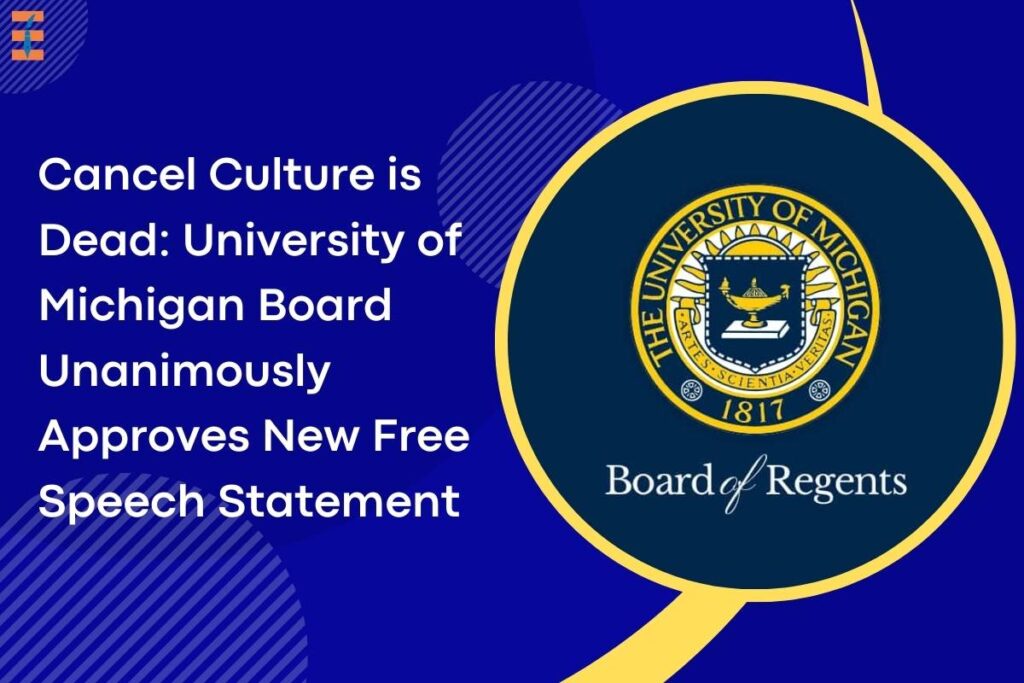Source – University of Michigan
In a historic vote, the University Of Michigan Board Of Regents unanimously approved a new statement on free speech during a special meeting, marking a significant move against cancel culture. President Santa Ono emphasized the importance of the vote, stating that, in times of great division, it is crucial to come together in a shared commitment to pluralism, mutual respect, freedom of speech, and diversity of thought.
The approved statement follows a period of public feedback and comment on updated principles drafted by university faculty and officials. These principles aim to reaffirm the university’s dedication to freedom of expression and diversity of thought. The last time such a statement was approved was in 1988, and the newly approved principles are being hailed as the “North Star” of the university, sitting alongside its mission statement.
Cancel culture is dead at the University of Michigan
Regent Mark Bernstein, a Democrat and lawyer, declared that the principles unequivocally state that cancel culture is dead at the University of Michigan. He emphasized the institution’s long and proud history of engaging in robust discussions on issues of societal consequence and actively confronting controversial topics, a cultural hallmark fully embraced by the university.
Republican Regent Ron Weiser highlighted key sentences in the statement, particularly the university’s commitment to stimulating and supporting diverse ideas and viewpoints. Weiser emphasized the importance of maintaining open conversations and understanding that differences of opinion are inherent in a university setting. He warned against the dangers of ceasing discussions, emphasizing that it is dialogue that prevents conflicts.
Democrat Regent Denise Ilitch added that free speech is at the core of the university’s values, underlining the significance of fostering an environment that encourages open expression of ideas.
Regent Chair Sarah Hubbard, a Republican, drew attention to a passage in the statement that commits the university to meet conflict and controversy with understanding and reason. She stressed the importance of inviting diverse thought leaders to campus to fulfill the promise of the new policy, moving beyond canceling speakers and encouraging balanced debates.
Free speech extends to the right to learn and engage on campus
The draft statement, which the board approved, was shaped by input from faculty, staff, students, and alumni. Tim Lynch, the university’s counsel, acknowledged the contribution of the Foundation for Individual Rights and Expressions, a Philadelphia-based nonprofit dedicated to protecting speech rights. The board recognized the relevance of this statement in light of incidents at other universities involving free speech, emphasizing the need to go beyond allowing unpopular groups to speak and actively encouraging diverse speech.
Regent Jordan Acker, a Democrat and attorney, emphasized the broader commitment to academic freedom, stating that free speech extends to the right to learn and engage on campus, even on unpopular topics. He urged campus leaders to not only allow free speech but also to encourage it, highlighting the intertwined nature of free speech and academic freedom.
While affirming the university’s commitment to speech rights, the approved principles also clarify that not all ideas are of equal value. The commitment to free expression does not extend to speech or conduct that violates the law or university policy, including targeted speech involving bullying, defamation, destruction of property, harassment, violence, or threats.
The University of Michigan’s unanimous approval of these principles signals a robust commitment to upholding free speech and fostering an environment where diverse ideas can flourish, challenging the constraints of cancel culture.
Also Read: America’s 250th Anniversary: A Time for Reflection and Civic Renewal










